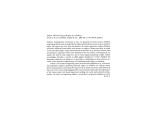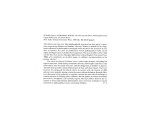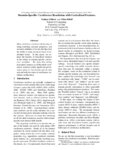Filters: Collection: "ir_uspace"
| Creator | Title | Description | Subject | Date | ||
|---|---|---|---|---|---|---|
| 1 |
 |
Hanna, Patricia Lee | Equal rights for children (book review) | A review of the book "Equal Rights for Children" by Howard Cohen. | Books, reviews; Equal rights; Children | 1982-04 |
| 2 |
 |
Riloff, Ellen M. | Semantic class learning from the web with hyponym pattern linkage graphs | We present a novel approach to weakly supervised semantic class learning from the web, using a single powerful hyponym pattern combined with graph structures, which capture two properties associated with pattern-based extractions: popularity and productivity. Intuitively, a candidate is popular if ... | Weakly supervised; Semantic class learning; Hyponym pattern; Pattern-based extractions; Class name; Seed instance | 2008 |
| 3 |
 |
Hanna, Patricia Lee | Having children: philosophical and legal reflections on parenthood (Book Review) | A review of the book "Having Children: Philosophical and Legal Reflections on Parenthood". | Books, reviews; Parenthood; Philosophy; Law | 1981-07 |
| 4 |
 |
Hanna, Patricia Lee | Moral dimensions of academic administration (Book Review) | Reviews the book `The Moral Dimensions of Academic Administration,' by Rudolph H. Weingartner. | Books, reviews; School management & organization; nonfiction | 2002-07 |
| 5 |
 |
Hanna, Patricia Lee | Whose child? children's rights, parental authority and state power (Book Review) | A review of the book "Whose Child? Children's Rights, Parental Authority and State Power" edited by William Aiken and Hugh LaFollette. | Books, reviews; Children's rights | 1981-10 |
| 6 |
 |
Hanna, Patricia Lee | Education, society, and human nature: an introduction to the Philosophy; of education (book review) | A review of the book "Education, society, and human nature: an introduction to the Philosophy; of education" by Anthony O'Hear. | Books, reviews; Education, Philosophy | 1982-07 |
| 7 |
 |
Riloff, Ellen M. | Domain-specific coreference resolution with lexicalized features | Most coreference resolvers rely heavily on string matching, syntactic properties, and semantic attributes of words, but they lack the ability to make decisions based on individual words. In this paper, we explore the benefits of lexicalized features in the setting of domain-specific coreference reso... | 2014-01-01 | |
| 8 |
 |
Riloff, Ellen M. | Corpus-based semantic lexicon induction with web-based corroboration | Various techniques have been developed to automatically induce semantic dictionaries from text corpora and from the Web. Our research combines corpus-based semantic lexicon induction with statistics acquired from the Web to improve the accuracy of automatically acquired domain-specific dictionari... | Corpus-based; Text corpora; Domain-specific dictionaries; Bootstrapping algorithm | 2009 |
| 9 |
 |
Riloff, Ellen M. | Learning domain-specific information extraction patterns from the web | Many information extraction (IE) systems rely on manually annotated training data to learn patterns or rules for extracting information about events. Manually annotating data is expensive, however, and a new data set must be annotated for each domain. So most IE training sets are relatively small. C... | Information extraction; Domain-specific; Annotated training sets; MUC-4 | 2006 |
| 10 |
 |
Riloff, Ellen M. | Learning subjective nouns using extraction pattern bootstrapping | We explore the idea of creating a subjectivity classifier that uses lists of subjective nouns learned by bootstrapping algorithms. The goal of our research is to develop a system that can distinguish subjective sentences from objective sentences. First, we use two bootstrapping algorithms that explo... | Subjective nouns; Bootstrapping; Extraction patterns; Subjectivity classifier; Naive Bayes classifier | 2003 |
| 11 |
 |
Riloff, Ellen M. | Conundrums in noun phrase coreference resolution: making sense of the state-of-the-art | We aim to shed light on the state-of-the-art in NP coreference resolution by teasing apart the differences in the MUC and ACE task definitions, the assumptions made in evaluation methodologies, and inherent differences in text corpora. First, we examine three subproblems that play a role in coref... | Noun phrase; Coreference resolution; MUC; ACE | 2009 |
| 12 |
 |
Riloff, Ellen M. | Bootstrapping method for learning semantic lexicons using extraction pattern contexts | This paper describes a bootstrapping algorithm called Basilisk that learns high-quality semantic lexicons for multiple categories. Basilisk begins with an unannotated corpus and seed words for each semantic category, which are then bootstrapped to learn new words for each category. Basilisk hypothe... | Basilisk; Bootstrapping method; Semantic lexicons | 2002 |
| 13 |
 |
Riloff, Ellen M. | Corpus-based identification of non-anaphoric noun phrases | Coreference resolution involves finding antecedents for anaphoric discourse entities, such as definite noun phrases. But many definite noun phrases are not anaphoric because their meaning can be understood from general world knowledge (e.g., "the White House" or "the news media"). We have develope... | Corpus-based identification; Non-anaphoric noun phrases; Coreference resolution; MUC-4; Discourse entity; DE | 1999 |
| 14 |
 |
Riloff, Ellen M. | Identifying sources of opinions with conditional random fields and extraction patterns | Recent systems have been developed for sentiment classification, opinion recognition, and opinion analysis (e.g., detecting polarity and strength). We pursue another aspect of opinion analysis: identifying the sources of opinions, emotions, and sentiments. We view this problem as an information ext... | Sentiment classification; Opinion recognition; Opinion analysis; Conditional random fields; AutoSlog; Sources of opinions | 2005 |
| 15 |
 |
Riloff, Ellen M. | Unsupervised learning of contextual role knowledge for coreference resolution | We present a coreference resolver called BABAR that uses contextual role knowledge to evaluate possible antecedents for an anaphor. BABAR uses information extraction patterns to identify contextual roles and creates four contextual role knowledge sources using unsupervised learning. These knowledge ... | Coreference resolution; Coreference resolver; BABAR; Contextual role knowledge; Unsupervised learning | 2004 |
| 16 |
 |
Riloff, Ellen M. | Corpus-based bootstrapping algorithm for semi-automated semantic lexicon construction | Many applications need a lexicon that represents semantic information but acquiring lexical information is time consuming. We present a corpus-based bootstrapping algorithm that assists users in creating domain-specifi c semantic lexicons quickly. Our algorithm uses a representative text corpus for ... | Bootstrapping algorithm; Lexicon construction | 1999-06 |
| 17 |
 |
Kraus, Peter L. | Information literacy for German language & literature at the graduate level: new approaches and models | At the University of Utah the recent hiring of several new faculty members in the German Language and Literature Section of the Modern Languages department has resulted in an increased demand for library services in the area of instruction and technical support. Areas explored will include approache... | Germanic languages; Higher Education; Librarianship | 2007 |
| 18 |
 |
Hanna, Patricia Lee | Summaries and comments on Lappin, S. Sorts, ontology and metaphor: the semantics of sortal structure | In this interesting study, Shalom Lappin argues that any adequate theory of sortal incorrectness must meet four requirements. First, it must account for the truth valuelessness of sortally incorrect sentences. Second, it must provide a means of distinguishing truth valuelessness arising from sortal... | Valuelessness; Incorrectness | 1983 |
| 19 |
 |
Riloff, Ellen M. | Exploiting strong syntactic heuristics and co-training to learn semantic lexicons | We present a bootstrapping method that uses strong syntactic heuristics to learn semantic lexicons. The three sources of information are appositives, compound nouns, and ISA clauses. We apply heuristics to these syntactic structures, embed them in a bootstrapping architecture, and combine them with... | Syntactic heuristics; Semantic lexicons; Bootstrapping method; Appositives; Compound nouns; ISA clauses; Co-training | 2002 |
| 20 |
 |
Riloff, Ellen M. | Effective information extraction with semantic affinity patterns and relevant regions | We present an information extraction system that decouples the tasks of finding relevant regions of text and applying extraction patterns. We create a self-trained relevant sentence classifier to identify relevant regions, and use a semantic affinity measure to automatically learn domain-relevant ex... | Information extraction; Semantic affinity patterns; Relevant regions; MUC-4 terrorism corpus; ProMed disease outbreak stories | 2007 |
| 21 |
 |
Hanna, Patricia Lee | What might speakers '"Tacitly know"? | The theory of innate ideas, as revived by certain developments in transformational grammar, has been the subject of extensive discussion. In this paper I shall argue that there are no grounds at present for the claim, advanced by rationalist linguists, that one must posit certain highly specific it... | Rationalist; Linguistics; Knowledge | 1977 |
| 22 |
 |
Riloff, Ellen M. | Inducing information extraction systems for new languages via cross-language projection | Information extraction (IE) systems are costly to build because they require development texts, parsing tools, and specialized dictionaries for each application domain and each natural language that needs to be processed. We present a novel method for rapidly creating IE systems for new languages by... | Information extraction; IE systems; Cross-language projection; English; French | 2002 |
| 23 |
 |
Riloff, Ellen M. | Unified model of phrasal and sentential evidence for information extraction | Information Extraction (IE) systems that extract role fillers for events typically look at the local context surrounding a phrase when deciding whether to extract it. Often, however, role fillers occur in clauses that are not directly linked to an event word. We present a new model for event extract... | Information extraction; Phrasal evidence; Sentential evidence; Role fillers; Event extraction; Sentential event recognizer; Plausible roll-filler recognizer | 2009 |
| 24 |
 |
Riloff, Ellen M. | Toward completeness in concept extraction and classification | Many algorithms extract terms from text together with some kind of taxonomic classification (is-a) link. However, the general approaches used today, and specifically the methods of evaluating results, exhibit serious shortcomings. Harvesting without focusing on a specific conceptual area may deliv... | Concept extraction; Concept classification | 2009 |
| 25 |
 |
Riloff, Ellen M. | Corpus-based approach for building semantic lexicons | Semantic knowledge can be a great asset to natural language processing systems, but it is usually hand-coded for each application. Although some semantic information is available in general-purpose knowledge bases such as Word Net and Cyc, many applications require domain-specific lexicons that repr... | Corpus-based method; Semantic lexicons | 1997 |
